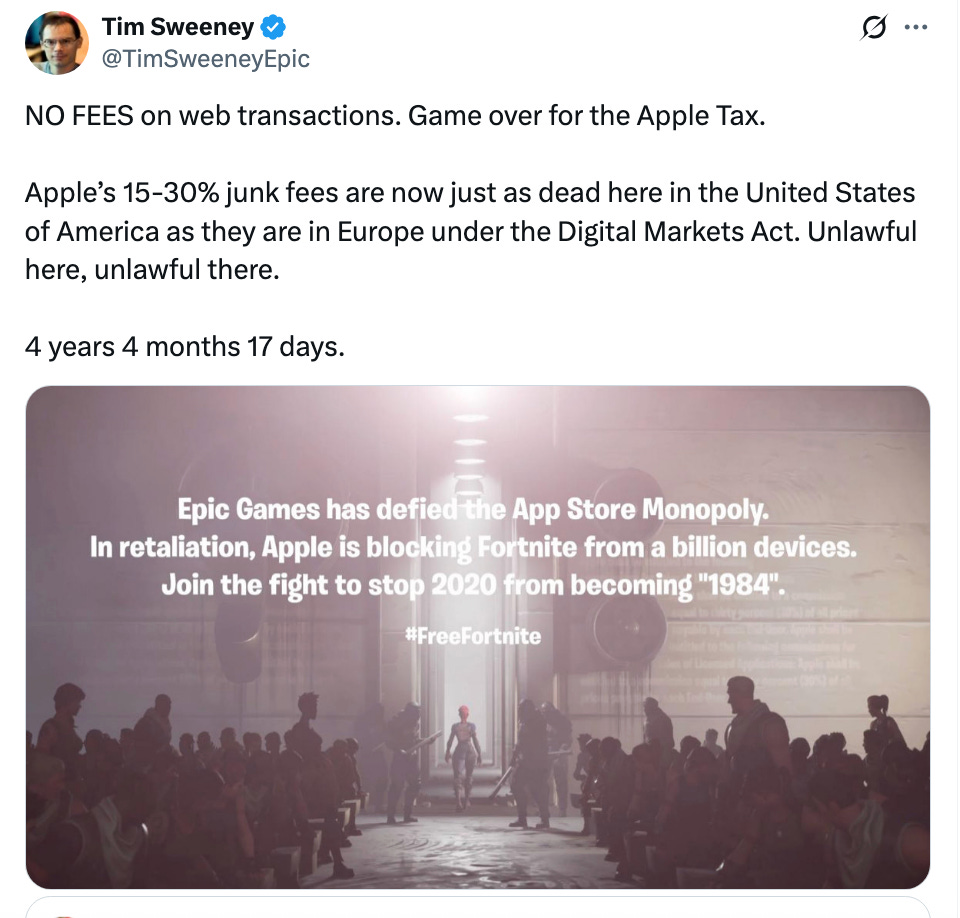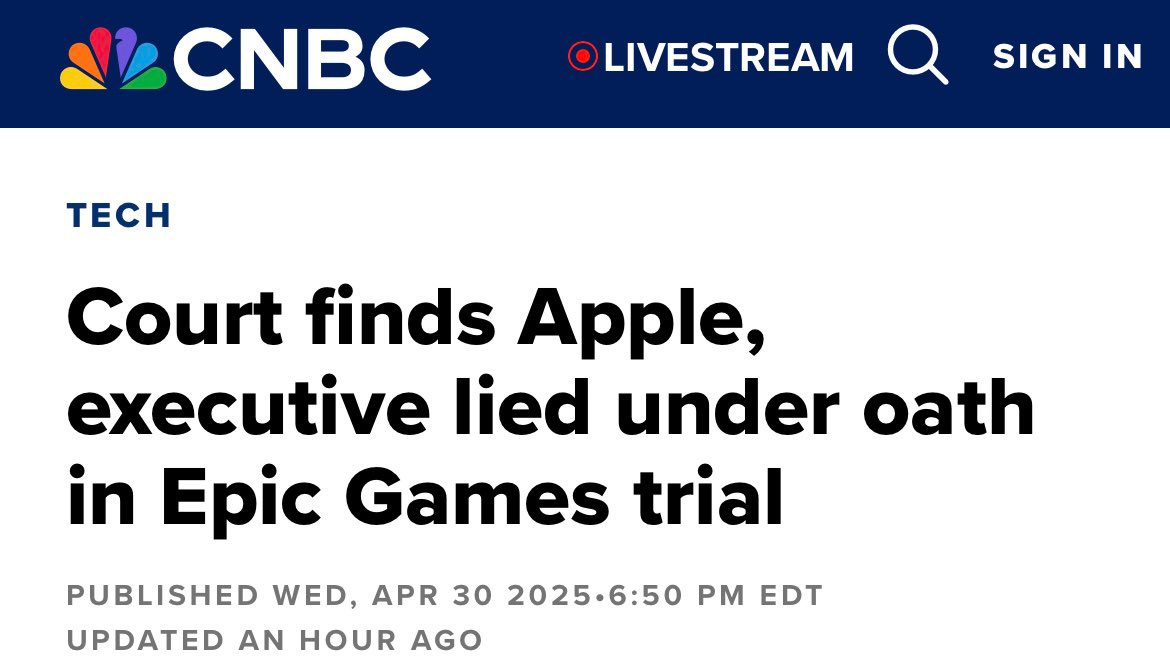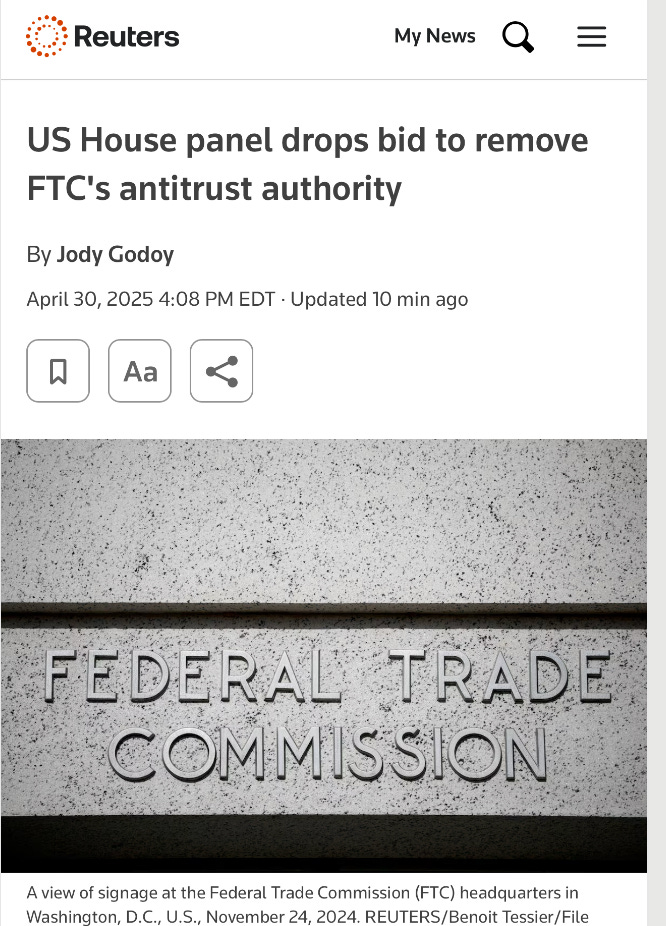Ok, two quick pieces of good news. The first is that a judge in Northern California, Yvonne Gonzalez Rogers, issued a very harsh rebuke to Apple over its control of the iPhone app store. The order is part of a long-standing antitrust case brought by Epic Games against Apple in 2020.
In 2021, Epic Games lost on the Federal antitrust charges, but won on a state claim of unfair conduct, specifically over its refusal to let app developers communicate with or give consumers a place outside of the app store to pay for apps. The judge found that Apple’s conduct “allowed it to reap supracompetitive operating margins,” and ordered it to let app developers communicate with customers and buy apps outside the App store. The case went on appeal, with the Ninth Circuit upholding the decision and order. In January of 2024, the Supreme Court refused to hear the appeal, and Gonzalez Rogers’s order went into effect.
Since then, Apple has engaged in bad faith tactics to avoid complying. Today, Gonzalez Rogers sanctioned the company and ordered Apple to allow app developers to sell their apps outside of the App Store without a fee. That’s a huge deal. For some context, the New York Times says that app store fees “makes up a large portion of the nearly $100 billion in annual services revenue that Apple collects.”
Epic’s CEO was jubilant, explaining what the decision means.
That’s not all. For a year and a half, Apple has engaged in bad faith, levying a variety of different and new fees to app developers to get around the spirit of the judicial order. It put up scare screens, engaged in sleazy privilege claims, and lied under oath to the judge about its decision-making. Normally these kinds of tactics happen without consequence for important business executives. But this time, the judge accused Apple Vice-President of Finance, Alex Roman, of having “outright lied under oath,” and referred the matter to the U.S. Attorney for a criminal contempt investigation. She also went out of her way to blame Apple CEO Tim Cook directly.
It’s really worth reading these two full paragraphs of the judge’s decision.
In stark contrast to Apple’s initial in-court testimony, contemporaneous business documents reveal that Apple knew exactly what it was doing and at every turn chose the most anticompetitive option. To hide the truth, Vice-President of Finance, Alex Roman, outright lied under oath. Internally, Phillip Schiller had advocated that Apple comply with the Injunction, but Tim Cook ignored Schiller and instead allowed Chief Financial Officer Luca Maestri and his finance team to convince him otherwise. Cook chose poorly. The real evidence, detailed herein, more than meets the clear and convincing standard to find a violation. The Court refers the matter to the United States Attorney for the Northern District of California to investigate whether criminal contempt proceedings are appropriate.
This is an injunction, not a negotiation. There are no do-overs once a party willfully disregards a court order. Time is of the essence. The Court will not tolerate further delays. As previously ordered, Apple will not impede competition. The Court enjoins Apple from implementing its new anticompetitive acts to avoid compliance with the Injunction. Effective immediately Apple will no longer impede developers’ ability to communicate with users nor will they levy or impose a new commission on off-app purchases
Now that is brutal. Apple says it will comply, though it will also appeal the decision. That means tomorrow, developers will have a bunch of new options for how to sell apps; the whole app economy could change if the Ninth Circuit doesn’t issue a stay of the order, meaning that this decision is the first time we’ll see a big tech remedy in an antitrust case actually make a serious real-world difference
And here’s a headline that puts a fine point on what happened.
And now on to the second piece of good news. On Monday, I traced a proposal from Republican leader Jim Jordan, who chairs the House Judiciary Committee, to eliminate a key antitrust law, which is the Federal Trade Commission’s authority to ban “unfair methods of competition.” That’s the authority used in several important cases, including one involving Amazon, another targeting UnitedHealth Group and CVS, as well as a seed and chemical case where the defendants are Corteva and Syngenta. The committee hearing was today, and Jordan ultimately pulled the proposal.
Jordan was seeking to hide a significant change to antitrust underneath a procedural shift. His legislation would have merged the FTC’s competition division into the Department of Justice Antitrust Division, which sounds like some boring bureaucratic reshuffling, bit it’s not. The trick however, is though both enforcers apply the Sherman and Clayton Act, they also have different authorities. The FTC can go beyond the Sherman and Clayton Act, barring “unfair methods of competition” that don’t quite meet the standards of the other antitrust laws. And when Jordan put out text folding the FTC staff and resources into the Antitrust Division, he didn’t move the FTC’s extra authority to the Antitrust Division. So it was a tricky way to kill this authority, and harm the cases based on it.
In other words, it was a sneak attack. It makes sense why he’d try it this way; changing antitrust law is very hard. You need to pass it out of the House of Representatives with a majority, and then get 60 votes in the Senate. Jordan’s approach was to short-circuit this path by attaching this legislation to the much bigger tax cut bill moving forward, the hope being no one would really notice. Such an approach had two advantages. First, while individual Congressmen might not like each particular component of such a bill, most wouldn’t sink the whole thing over a shift of this authority. And second, the tax bill, for boring reasons, only requires 50 votes in the Senate.
Jim Jordan is a conservative Republican leader who is very well-respected on the right. But in this case, he stepped on a rake. Our work set off a bit of a firestorm. First, a host of former antitrust enforcers expressed concern, pointing out that the legislation wasn’t just a harmless set of seating chart changes. Naturally, the Democrats were not on board with rolling back antitrust law and weakening the FTC, with Congresswomen Becca Balint and Pramila Jayapal speaking out in the committee markup. That was important, though expected.
What was *not* expected was opposition from populist right and small business groups. Yesterday, Steve Bannon went on his show War Room with Mike Davis, a conservative anti-big tech foe. The two of them absolutely laid into Jordan for taking the side of firms like Meta and Google, and in their view undermining the Trump antitrust agenda. A lot of War Room listeners presumably called into Republican offices.
But that’s not all. There are a lot of business people, like pharmacists, app developers, grocers, and farmers who are reliant on the increasingly active antitrust enforcement regime. And some of them no doubt started getting into contact with GOP members on the committee. It’s rare for trade associations to move particularly quickly, but the National Grocers Association, which leads a coalition seeking to revive price discrimination laws, put out a note of concern.
Anyway, the net effect is that today, at the committee markup, Jordan quietly announced some technical changes to the bill. One of them was to eliminate the FTC provisions.
So there we go. The campaign against monopoly keeps rolling on, and I keep being surprised by how many wins we always seem to chalk up.












